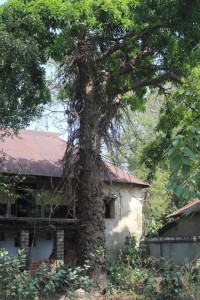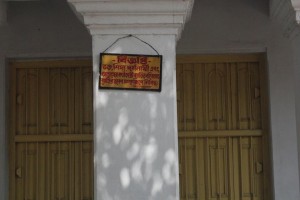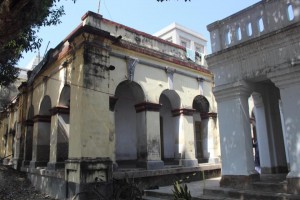In his previous life, His Holiness Mahatapasvi Shri Kumarswamiji was in Gyanganj (Jnanganj) Ashram in the Himalayas. His name was Swami Kshemananda then and his Guru was Paramhansa Swami Nemananda Ji. In Jnanganj Ashram there are two branches – Yoga and Science. Swami Kshemananda Ji was a student in Yoga branch. In this life, as Shri Kumarswamiji, he was in close and continuous contact with Gyanganj Ashram. Gyanganj Ashram has many adepts working for the benefit of mankind and the whole universe. To mention a few names of the adepts of Gyanganj Ashram – Paramhansa Maha Tapa Ji Maharaj, Paramhansa Bhrigu Rama Ji, Paramhansa Nemanand Ji, Paramhansa Abhayanand Ji, Paramhansa Jnana-nanda Ji, Paramhansa Vishuddhananda Ji. There are many Bhairavis (women adepts) too – Uma Bhairavi, Shama Bhairavi, Jnana Bhairavi etc. While Paramhansa MahaTapa Ji Maharaj is head of Jnangang Ashram, Uma Bhairavi is head of medical unit of Jnanganj Ashram.
Paramhansa Vishuddhanand Ji Gandhababa is His Holiness Shri Kumarswamiji’s Guru-bandhu (brother-disciple) from his past life. Towards the end of his this life, Shri Kumarswamiji consulted with his Gurudeva and the adepts from Gyanganj Ashram; for his Sadhana (penance and spiritual practices) in this life was not complete and asked them what should be next course of action therefore. The adepts asked Shri Kumarswamiji to build a temple with his own money and place the spiritual power which he had accumulated in his 50-years long penanace. At the mandate of the adepts from Gyanganj Ashram, Shri Kumarswamiji built Divya Devalaya, the Divine Temple in 1995 at Tapovan, Dharwad. The Divine Temple does not have any image or idol or deity. It has 7 mantras written on the wall which holds Shri Swamiji’s spiritual power. The adepts also told Shri Kumarswamiji that they would send one of their adepts (Siddha-purush) from Jnanganj to reside in the Divine Temple. Accordingly Shri Kumarswamiji’s elder Guru-bandhu, Paramhansa Shri Vishuddhanand Ji Gandhbaba has come to stay in the Divine Temple at Dharwad in his subtle body.
The Divine Temple is maintained in strict accordance with the rules laid by the adepts from Jnanganj ashram.
Baba’s Personality
The Personality of Yogiraj Vishuddhanand Paramahansa – Shri Vishuddhanand Paramahansadeva’s physical body was extraordinary, his spiritual practices were wonderful and his way of life exceptional in many ways. His character was spotless. He had a strict sense of discipline, regularity and adherence to rules and regulations. He was very kind-hearted and considerate. He possessed a very keen intellect and would accomplish jobs with dexterity and skill. He had an independent nature and his behaviour with all was always very charming and courteous. He was a self-realized Yogi of exemplary character. Very rarely in the world today, do you come across a pure and pious soul like him, in whom you find a very balanced mixture of grandeur coupled with extreme compassion. He had reached the very climax in all three Yogas of Karma, Gyan & Bhakti and finally attained Prem. Through very austere spiritual practices and the extraordinary grace of Deities, he acquired complete knowledge of all the truths and realities of the inner and outer worlds and thereafter attained the supreme state of self-realization.
Baba’s body
As a result of austere practice, Baba did not need to inhale the polluted air from the outside atmosphere. He would rather breathe self-purified air from within his body and that too through his navel and not through the nose as we humans normally do. His body had been highly purified and that is why the air inside his body was pure too. His body always emitted the Padma Gandha (lotus fragrance) continuously. This stage is reached when one attains the ability to confine the movement of his breath through Sushumna Nadi. Thereafter one’s body, breath and mind all get purified serially one after the other. Baba’s perspiration and faeces matter were also full of fragrance, unlike ours. At the time of worship the whole worship-room used to get filled with lotus-fragrance. His body was surcharged with electromagnetic current of such high intensity that poisonous insects like wasps, hornets, black-bees, mosquitos etc. would die instantly they bit him. Once a disciple put a question to Baba, ”Baba, is there any difference between a Yogi’s body and that of an ordinary person? Seemingly they look so much alike.” Baba just pushed his hand through a wall which was quite a distance away, by just elongating his arm and his hand was visible on the other side of the wall. Similarly on another occasion, a disciple, after obtaining special permission, was pressing Baba’s legs (Baba would not normally allow anybody to touch his feet or body). Suddenly quite a few ‘sphatics’, transparent crystal balls oozed out of Baba’s legs. Baba pushed these big crystal balls back into his legs through the tiny pores of his body.
Baba’s Gaze
Through the intensity of his gaze, he set ablaze the silk sheet lying on the shoulders of the astrologer-pundit during his stay at Burdwan. Also a Shiva-Linga crystal brought by a Sadhu to test Baba’s Yoga-Shakti could not withstand Baba’s gaze and was blown to pieces. On another occasion, Baba extracted the chronic disease of a very sick person through his gaze. When he fixed it on to a Banalinga, the Banalinga could not withstand the intensity of Baba’s gaze and burst.
Baba’s residence at his native place, Bondul
Baba’s Food
Baba used to eat only once in a day, at about 10a.m., after the morning Bhog and Arati of the Deities was over. If for any special reason he failed to take his meals by this time, he used to forego his meals altogether for that day. His food usually consisted of rice, mung or chana dal, cooked along with raw papaya in it. Amongst vegetables he particularly preferred ochcha (very small karela), zamikand, kashiphal or sitaphal, brinjal, patal or parwal and ninua or torai. Before partaking his food, his first morsel would invariably be a bit of ‘Kumari Prasad’. This might consist of one or two batashas, one or two pieces of banana, a rasogulla or chamcham or a bit of bundi or khir – any one or two of these picked out of leftover from the pattal (plate formed of big leaves of trees) of a Kumari after she had finished eating plus a little halwa of Gopalji’s Bhog. Baba considered a ‘Kumari’ to be the true manifestation on this earth of God mother, ‘Jagadamba’.
Baba’s Sleep
Baba would go to sleep at 9.00 p.m. exactly by the watch and get up at 11.00 p.m. He used to say that sleep during these two hours is most refreshing and sound. It is equal to four hours sleep from 11.00 p.m. to 3.00 a.m. and equal to six to eight hours later during day time. After awaking at 11.00 p.m., he would attend the call of nature, brush his teeth, massage oil on to his body and take a bath. Thereafter from 11.30 p.m. till 3.30 a.m. he would sit on his Asan and perform his Kriya worship. Then he would take yet another half an hour or more to descend from that exhalted supersensuous state of trance to the normal human plane, when he would be in a mood and like to converse with disciples and devotees.
His Nature
Baba was very simple-hearted. His nature was like that of a child, full of innocence, love, humility, straightforwardness, truth and honesty. There was not an iota of deceit or conceit in him. He was ever gentle and courteous in behaviour and familiarity always brought him closer to you. He was very kind and compassionate particularly towards the poor and those in distress. Besides being very generous at heart he had a very charitable disposition.
Baba’s truthfulness
Baba was inflexible in his opposition to untruth. He is never known to have spoken a lie throughout his whole life. He advised his disciples also never to take the line of untruth, irrespective of the consequences. But if any truth was unpleasant, he advised against stating it, suggesting silence in such cases. If, however, a fact had to be stated, ‘Truth and nothing but the Truth’ was his motto. He would say that once one got established in Truth, anything, thereafter coming out of his mouth, would happen exactly as uttered. His character was spotless and his conduct exemplary.
Simplicity of Nature
Baba related a story of his own stupidity as follows: ”I was no less foolish than the poet Kalidas. Kalidas was cutting that very branch of the tree on which he was sitting; my performance was even a shade better in stupidity.” It was like this: ”Once quite a few of us Sanyasis had gone in a group to Vindhyachal hills. One day we saw a ripe mango on the branch of a mango tree, on top of the hill. Quite a few of us spotted it simultaneously and all rushed to the tree and climbed up. Without a thought of consequences, I was the first to leap from the branch to catch hold of the mango, but came crashing down on to the rocky floor fifty feet below and became unconscious. When I regained consciousness, I found myself being flown over the Vindhyachal hills by my Guru Swami Bhriguram Paramahansa. Seeing him, I got a bit frightened. He placed me there and called me ‘a stupid fool’ for the way I had behaved. I just kept quiet. Then he asked me to eat the mango. On first impulse I refused. At this, he said, ”But why not? Was it not for this very mango that all this untoward incident has taken place? Now eat it up.” I did as I was told. Owing to the fall from the tree on to the rocks, I had received many cuts and bruises on my body and thighs. After applying ointment on to my wounds, he said, ”Now promise that you will not repeat such a stupid thing again.” I replied, ”But why not? I shall do so again.” He was aghast at hearing my reply and just kept staring at me. Seeing him wonder-struck, I just said, ”Sir, I can afford to be stupid again. After all, nothing has happened to me. And as long as you are there to protect me, I see absolutely no reason for me to be afraid of anything.” Dada Gurudeva, Swami Bhriguram laughed and after placing his hand of blessing over my head, he left. This shows how stupidly straightforward and simple-minded Baba Vishuddhanand was.
Baba’s Devotion to Duty – Karma
Baba was a great exponent of extreme one-pointed devotion to duty as per the tenets of the Shastras, and proper conduct in every sphere of life. He was never satisfied with mere showmanship but wanted sincere service and unfailing application to one’s Karma or Kriya. Baba used to say, ”Unless you do your duty assiduously, no amount of reading the Shastras, even for a million of years, is going to give you Gyan (knowledge). Scriptures can only show you the way but you shall reach your goal only by treading it yourself sincerely and steadily, bit by bit. You can change your destiny even by dint of persistent arduous practice. Unceasing effort is of inestimable value. Yogabhyas is the real purpose of life and continuous effort in that direction, the real Karma.”
Baba’s Non-Attachment
As per the orders of his Guru, Maharshi Mahatapa, Baba adopted the life of a householder. But during his whole lifetime he never got engrossed in worldliness (materialism) and false attachment. He kept himself mentally aloof from all attachment to worldly beings of things. His wife bore him two sons and a daughter. The elder son was named Durgadas and the younger Haridas. In the year 1911, a little after the establishment of the Ashram at Bondul, Baba lost his wife and the same year his mother also. And soon after, he lost his son Haridas and the daughter also. The death of a single close relative causes so much mental agony and here Baba had to face the death of wife, mother, son and daughter, four of them, in quick succession. This could have turned any human being insane, but Baba bore the losses and grief with great fortitude. Taking it all very philosophically as the will of the Creator, he did not allow his mental equilibrium and tranquility of mind to be disturbed and kept calm and composed. He proved to the hilt, the dictum of the Shastras that ”One who has attained self-realization is no longer affected by the sad happenings and griefs of this world.” Such was Baba’s non-attachment.
Baba’s Implicit Faith In the Veracity of the Shastras (scriptures)
Shri Baba had implicit faith in the veracity of the Shastras. He used to emphatically state that every word of what was stated in the Hindu Shastras was true. It is only to those who fail to interpret them accurately at times, that some statements made therein appear to be wrong. Whenever anybody brought any apparent incongruity to Baba’s notice, he would prove the veracity of the Shastras by practical demonstration and remove the last iota of doubt from hsi mind.
Baba’s Compassion
Once when asked about his relationships with his disciples, i.e., Guru-Shishya-Sambandh, Baba said, ”It is the same as between father and son. I keep watch over you at all times, save you from pitfalls and accidents, cure your diseases, help you out from difficult situations and am all the time engaged in forthering your spiritual progress.”
The above information is taken from the book – “Yogirajadhiraj Swami VISHUDDHANAND PARAMAHANSADEVA, Life & Philosophy” by Nand Lal Gupta, an ardent disciple of Shri Babaji for the benefit of Babaji’s devotees across the world..




